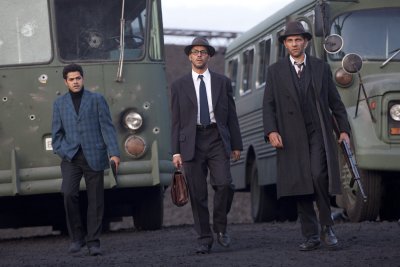Reviews - Outside The Law
Outside The Law
Reviewed By John Stakes

Outside The Law
Director Rachid Bouchareb’s contribution to the “best foreign language film” nominations at the annual Oscar ceremonies has been immense, and his 2010 “Outside the Law” (“Hors La Loi”) shown last Sunday was the third time his films had been nominated in this category in a career spanning over thirty years.
Although not strictly a sequel “Outside the Law” takes up where his second nominated film the 2006 “Days of Glory” left off at the end of WW2, preceded by a short sequence in 1925 when the family’s land was sequestrated. The story follows the lives of three Algerian brothers in France with the Algerian War as its backdrop. Some of the North Africans who had fought in WW2 for France (only to be later discarded and denied pensions), were now to find themselves fighting against their paymasters as Algeria fought for its independence. The three brothers Said, Messaoud and Abdelkader are respectively played by Jamel Debbouze, Roschdy Zem and Saimi Bouajila, all of whom had appeared in the earlier film as the characters they now depict, and collectively won the best actor award at Cannes in 2006.
Having lost their family home the three brothers and their mother are scattered around the world, Massaoud fighting for the French army in Indochina (Vietnam), Abdelkader leading the Algerian resistance in France, and Said moving to Paris to follow his fortunes in boxing halls and shady clubs. They reunite for the Algerian cause.
Critics of the manipulation of historical truth in feature films have found much in Bouchareb’s film on which to vent their spleen. Before its premier at Cannes 2010 French political commentators and in particular the Defence Historical Service were up in arms over the depiction of the 1945 Setif massacre in which the brothers’ father is killed. In a masterly constructed sequence Bouchareb presents the carnage as butchery by the French of Muslims whereas contrary opinion is that the Europeans were responding to Muslim atrocities against Europeans. Whatever the political and historical truth, the question is does the film work cinematically?
Yes it does, and in spades. Superficially “Outside the Law” comes across more as a gangster film than as a representation of a nationalistic struggle but there is much more to the mayhem than first meets the eye. Bouchareb fictionalises the origins of the Algerian FLN in the years leading up to Algerian independence. He thus poses the question whether freedom fighters are thugs, murderers or liberators and do their ends justify the blood-soaked means. The violence escalates as the police attempt to root out the brothers, and somewhat ironically, the only one of the three to survive is Said who was prepared to put his own business future ahead of the cause.
It’s a hugely stylised film. The brother protagonists are presented to stark visual effect as white collared but still shadowy vigilantes. The cinematography is impressive. As with “The Godfather” the action sequences are structured as fast moving set pieces all thrillingly choreographed, cleverly lit and wonderfully paced. The acting by all three leads was perfectly pitched, each effortlessly conveying their varying degrees of commitment to the cause, and all demonstrating perfectly how little they knew as to where this would take them or their country. The fighting came across as knee-jerk reaction to reprisals as the police fought to quell unrest by covert killings targeted at the ringleaders. Only when the police killings were finally caught on camera did the French Government’s strategy fail.
Despite its great sweep in time however the film never quite achieved the grandeur of say “The Godfather” with which it has been compared despite structural similarities. It was nonetheless an assured and impressive piece of film-making. Its graphic but never gratuitous violence belonged rather more to the world of organised crime than in the context of political insurgence for Bouchareb is at heart a humanist preferring to treat the personal struggle of the brothers as a prism for the wider conflict.
Now fifty two years old Bouchareb, a Muslim Algerian who has spent most of his working life focusing on Algerian/French issues, is no stranger to our own shores having, weeks earlier, directed the 2010 film “London River” about the 2005 London bombings and starring Brenda Blethyn. As with his Algerian films the humanist in him wanted to show how Muslims had also suffered in the London atrocity in which fifty six were killed and over two hundred injured, and, in so doing, tested the goodwill of the Finsbury Park locals where his film was shot.
Bouchareb is clearly very much his own man and a hugely talented force to be reckoned with in the world of modern cinema. An enthusiastic Keswick audience, having braved the elements were well rewarded.
Perhaps Bouchareb’s lasting legacy will be that following the unveiling of his “Days of Glory” at Cannes in 2006 the French Government reversed its pension policy and, Gurkha style, awarded the Algerian soldiers retrospective pensions. Such is the power of cinema!
Although not strictly a sequel “Outside the Law” takes up where his second nominated film the 2006 “Days of Glory” left off at the end of WW2, preceded by a short sequence in 1925 when the family’s land was sequestrated. The story follows the lives of three Algerian brothers in France with the Algerian War as its backdrop. Some of the North Africans who had fought in WW2 for France (only to be later discarded and denied pensions), were now to find themselves fighting against their paymasters as Algeria fought for its independence. The three brothers Said, Messaoud and Abdelkader are respectively played by Jamel Debbouze, Roschdy Zem and Saimi Bouajila, all of whom had appeared in the earlier film as the characters they now depict, and collectively won the best actor award at Cannes in 2006.
Having lost their family home the three brothers and their mother are scattered around the world, Massaoud fighting for the French army in Indochina (Vietnam), Abdelkader leading the Algerian resistance in France, and Said moving to Paris to follow his fortunes in boxing halls and shady clubs. They reunite for the Algerian cause.
Critics of the manipulation of historical truth in feature films have found much in Bouchareb’s film on which to vent their spleen. Before its premier at Cannes 2010 French political commentators and in particular the Defence Historical Service were up in arms over the depiction of the 1945 Setif massacre in which the brothers’ father is killed. In a masterly constructed sequence Bouchareb presents the carnage as butchery by the French of Muslims whereas contrary opinion is that the Europeans were responding to Muslim atrocities against Europeans. Whatever the political and historical truth, the question is does the film work cinematically?
Yes it does, and in spades. Superficially “Outside the Law” comes across more as a gangster film than as a representation of a nationalistic struggle but there is much more to the mayhem than first meets the eye. Bouchareb fictionalises the origins of the Algerian FLN in the years leading up to Algerian independence. He thus poses the question whether freedom fighters are thugs, murderers or liberators and do their ends justify the blood-soaked means. The violence escalates as the police attempt to root out the brothers, and somewhat ironically, the only one of the three to survive is Said who was prepared to put his own business future ahead of the cause.
It’s a hugely stylised film. The brother protagonists are presented to stark visual effect as white collared but still shadowy vigilantes. The cinematography is impressive. As with “The Godfather” the action sequences are structured as fast moving set pieces all thrillingly choreographed, cleverly lit and wonderfully paced. The acting by all three leads was perfectly pitched, each effortlessly conveying their varying degrees of commitment to the cause, and all demonstrating perfectly how little they knew as to where this would take them or their country. The fighting came across as knee-jerk reaction to reprisals as the police fought to quell unrest by covert killings targeted at the ringleaders. Only when the police killings were finally caught on camera did the French Government’s strategy fail.
Despite its great sweep in time however the film never quite achieved the grandeur of say “The Godfather” with which it has been compared despite structural similarities. It was nonetheless an assured and impressive piece of film-making. Its graphic but never gratuitous violence belonged rather more to the world of organised crime than in the context of political insurgence for Bouchareb is at heart a humanist preferring to treat the personal struggle of the brothers as a prism for the wider conflict.
Now fifty two years old Bouchareb, a Muslim Algerian who has spent most of his working life focusing on Algerian/French issues, is no stranger to our own shores having, weeks earlier, directed the 2010 film “London River” about the 2005 London bombings and starring Brenda Blethyn. As with his Algerian films the humanist in him wanted to show how Muslims had also suffered in the London atrocity in which fifty six were killed and over two hundred injured, and, in so doing, tested the goodwill of the Finsbury Park locals where his film was shot.
Bouchareb is clearly very much his own man and a hugely talented force to be reckoned with in the world of modern cinema. An enthusiastic Keswick audience, having braved the elements were well rewarded.
Perhaps Bouchareb’s lasting legacy will be that following the unveiling of his “Days of Glory” at Cannes in 2006 the French Government reversed its pension policy and, Gurkha style, awarded the Algerian soldiers retrospective pensions. Such is the power of cinema!
Find A Film
Search over 1500 films in the Keswick Film Club archive.
Friends
KFC is friends with Caldbeck Area Film Society and Brampton Film Club and members share benefits across all organisations
Awards
Keswick Film Club won the Best New Film Society at the British Federation Of Film Societies awards in 2000.
Since then, the club has won Film Society Of The Year and awards for Best Programme four times and Best Website twice.
We have also received numerous Distinctions and Commendations in categories including marketing, programming and website.
 Talking Pictures
The KFC Newsletter
Talking Pictures
The KFC Newsletter
Links Explore the internet with Keswick Film Club


